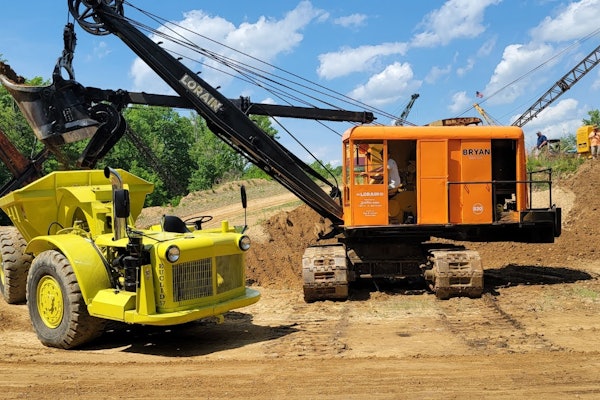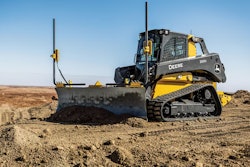Bill Morris has always been cautious and thoughtful, and it’s a business strategy that’s paid off.
After 27 years of slow, steady growth and building relationships with solid customers, Morris, owner of W.J. Morris Excavating, turns down as much work as he performs each year. Many times he could have doubled the company’s size overnight, but he knew that would have changed the dynamics of his business – and probably not to his liking. “I’m a hands-on person,” he says. “I wouldn’t be able to be as involved.”
With 17 employees and a firm that does an annual volume of $3 million in residential, commercial and industrial site preparation, Morris knows his clients well and doesn’t have to worry about getting paid. The diversity of his customer base also sets his mind at ease about fluctuations in the economy. “I think we’re pretty much recession-proof at this point,” he says.
Some of his customers are Stewart’s Shops, a convenience store chain and dairy food manufacturer; Skidmore College; Quad Graphics printing; and Roohan Realty, a large residential and commercial developer. When the printing industry hit a lull, Stewart’s was expanding, Morris says. And when housing slows down, the commercial market usually heats up.
Working day and night
Morris was 19 and working for a road construction company during the day and a towing garage at night when he bought his first piece of construction equipment. Morris rebuilt the aged, inoperable backhoe at the garage between service calls. He did the same with a dump truck and bulldozer and worked for himself on weekends. He officially started his company in 1979, when he was 24.
It was a bad time to launch a construction business. The economy was in a slump and interest rates were high. Morris’ father tried to talk his son out of quitting his day job. But Morris had made up his mind. With new construction practically non-existent, he took care of three cemeteries, excavated swimming pools and repaired septic systems.
As he had while helping his father growing up and in his subsequent jobs, Morris soaked up all the knowledge he could. “I’ve always had a tremendous interest in this business,” he says. “I’ve always had a passion for it. Anytime an opportunity came up, I took it just to get the experience.”
Morris’ company grew gradually. He started out doing small jobs for most of his customers, and when they had larger projects they insisted he do them. He paid for things as he went, never carrying much debt, and the firm branched into other types of construction. Morris’ wife, Judy, was his business partner from the beginning, running the construction company’s office, and she now manages the couple’s side ventures – a self-storage business, several real estate investments and apartment rentals.
Today W.J. Morris Excavating concentrates on turnkey site preparation work. The firm does earthmoving, pipe work and paving, working directly for site owners in most cases. Until six years ago, Morris hired subcontractors to do paving. “It’s been a great move for us,” he says of starting his own paving division. “It allows us to control the end product and our schedule. We like to take responsibility for the whole project.”
An expert other contractors call
Morris’ key clients aren’t the only ones vying for his attention. Municipalities and other contractors call on him when they encounter tough problems. Morris came to the rescue of Saratoga Springs in 2004 when a 100-year-old sewer line collapsed, creating a huge sinkhole on a major street a week before the city’s famed thoroughbred racing season. Morris and his crews worked around the clock for five days to finish the repair.
The town of Wilton also tracks down Morris for emergency excavation projects that will prevent road washouts or drainage problems.
Morris says regulations are one of the biggest challenges contractors face today, and he’s set out to become an expert in that field as well. The only way to cope with the array of OSHA, environmental and transportation department regulations is to learn the rules and play by them, he says.
In the late ’70s, OSHA wasn’t a big factor, most contractors didn’t know what a silt fence was and they didn’t have to notify city engineers of their job plans. When all that began to change Morris knew he needed to get up to speed. He was confused about OSHA regulations, so he signed himself up for one of the agency’s courses 20 years ago and has since taken several refresher courses. For the past 15 years he’s kicked off every building season by hiring a safety expert from the Associated General Contractors of America to speak to his employees. Morris’ insurance agent and a loss prevention expert also give presentations, and a local DOT enforcement officer inspects one of the company’s trucks, explaining the process to employees. Morris says he could give the same training but employees pay more attention to someone wearing a trooper hat and a gun on his hip.
Morris also uses this day to update employees on the company’s 401K program. He says taking a day out for these activities has been a great investment. He’s proud of his safety record and thinks it’s part of the reason why customers hire him. Finding an owner’s insurance agent on a jobsite is not unusual, and Morris Excavating gets good reviews. He also pays close attention to storm water rules, installing silt fences properly, maintaining them and stabilizing sites where no activity will take place for 14 days or more. Fines for violating storm water rules are similar to OSHA fines, he says, and a contractor’s reputation is at stake.
A clear formula for success
Morris says the secret to retaining good employees is simple, and it’s the same motto he uses to keep good customers: treat people right. His clients often ask for specific employees because they have been with Morris Excavating a long time and know what the customer needs and wants. Morris does snow removal work in the winter to keep his employees busy, and those who prefer to live off the money they make during the rest of the year can take winters off.
Morris does all the company’s bidding and Marcia Rich runs the office. She diligently reviews the firm’s payables and catches mistakes, which can have a big affect on the bottom line in an industry where prices haven’t risen along with costs.
Morris buys machines he uses consistently, and owns about 30 pieces of heavy equipment. He says an accountant would probably tell him to get rid of some of the machines, but after they’re paid for the cost to keep them is minimal. And because of the company’s maintenance program, Morris is able to stretch his purchasing dollars. “His oldest piece looks like his newest piece,” says Rodger Eaton, a salesman with Milton Cat.
Morris Excavating does its own preventive maintenance and dealers perform major repairs. Morris hired a dedicated mechanic and bought a mechanic’s truck last year, something he said he should have done five or 10 years ago. He’s held back because of two factors: he viewed a mechanic as overhead and the fact he grew up fixing things himself. But he discovered his time was better spent on other aspects of the business.
Morris doesn’t hesitate to rent equipment for occasional, intense use. Articulated trucks rank first on his list of rented machines, followed by large excavators and dozers.
Morris’ crews have been using lasers for years, and he’s currently researching GPS systems. He’s followed accuracy improvements and price decreases and had manufacturers demonstrate their systems at one of his sites this spring. He plans to start out with GPS surveying equipment and then move into machine control. “I don’t jump into anything,” he says, adding that eventually every contractor will have to use GPS technology. “I want to understand it completely.”
Still rock solid
Morris uses his expertise to give back to his community. He did the site preparation, utility and paving work for Mary’s Haven, a home where volunteers care for the terminally ill. He is also helping the YMCA build a new facility.
At 51, Morris has no plans to slow down. He wants to continue his pattern of steady growth. His son, Greg, is in a heavy equipment vocational program in high school and works for the company part time. Greg interned in the engineering department of a large construction firm, surprising its employees with how much he knew. “He grew up in this business,” Morris explains. When he’s not at school he’s at the shop or a jobsite.
Looking back, Morris says he has no regrets about how he’s run his business. I’ve passed on a lot of opportunities,” he says. “A lot of contractors get in trouble by taking on too much debt or working for bad customers. I’ve seen many companies come and go. But we’re still rock solid and moving forward.”
Other voices
“When other contractors get in a bind, they ask Bill for advice.” – Rick Dunn, vice president, Stewart’s Shops
“He’s probably the hardest working contractor in this area. I see him Monday through Sunday. His clients ask him to do jobs without taking bids. They trust him implicitly.” – Bob Cox, sales manager, Pallette Stone
“He’s the guy every aspiring contractor growing up wants to be like. He’s a class act.” – Rodger Eaton, salesman, Milton Cat
“The best part about Billy is he always thinks about the client’s money as if it’s his money.” – Tom Roohan, owner, Roohan Realty









